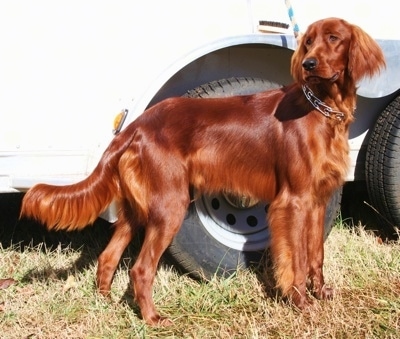
"Bama the Irish Setter at 11 months old loves the water, going for long walks, going with us when we ride bikes, swimming , riding in the car and truck, but most of all going with me when I ride the horses!! We moved the horses back home in their new fence, so I take Bama a lot with me! He is so good with the photograph thing! I'm a photographer so he makes taking pictures of him fun!! He loves to go to PetCo and PetSmart too! He loves butter cream icing, shrimp tails, dog cookies, raw hide chewies and birthday cake! And of course he hates to be scolded. He has gotten better when we leave him in the bus truck or car; he knows that we are coming back. This breed of dog is truly a smart one! If you have the time and are active with the outdoors this breed might be right for you!!"
ahy-rish set-er 
The Irish Setter is an active bird dog. The long, lean head is at least double the width between the ears than it is in length. When viewed from the front the skull is oval and when viewed from the top it is slightly domed. The body is slightly longer than tall. The muzzle is moderately deep with a distinct stop. The teeth meet in a scissors bite. The nose is either black or brown with wide open nostrils. The medium-sized eyes are almond shaped, set somewhat wide apart and are dark to medium brown in color. The triangular, low-set ears are thin and hang close to the head. The front legs are straight and the feet are rather small with arched toes. The long tail almost reaches the hock, is thicker at the base, tapering to a point. The coat is short and fine on the head and the front side of the legs and medium in length on other parts of the body. There is an even longer feathering on the ears, back of the legs, belly and brisket, extending to the chest. Coat colors include mahogany to a rich chestnut red. There is no black, but may be a small amount of white on the chest, throat, toes and sometimes a thin centered streak on the top of the head. Young dogs can sometimes have a silvery-gray color behind the ears and legs that usually disappears as the dog grows.
Irish Setters are energetic, intelligent, affectionate, loving, high-spirited and full of energy. They have no guarding instincts, get along with other pets and are good with children. This breed can be reckless and high-strung if it does not receive the proper amount of mental and physical exercise and may become destructive and hard to manage. Impulsive, with an independent spirit, they are sensitive to the tone of one's voice and will not listen if they sense that they are stronger minded than their owner, however they will also not respond well to harsh discipline. Owners need to be calm, yet possess an air of natural authority, being firm, confident and consistent, giving the dogs clear rules they must follow and sticking to them. Meek or passive owners or owners who do not provide enough exercise will find them to be difficult to train. Given firm handling and plenty of exercise, these dogs can be a joy to own. Start firm training early in life as it is easier to prevent behavior issues than it is to fix them once they start happening. Do not let this dog jump on humans, even as a small puppy. Teach them to heel on a lead and to let humans pass in and out gate and doorways before them. Relatively easily to housebreak. There are two types, field lines and show lines (bench). Field types are bred for hunting and field trial work and are generally somewhat smaller with shorter coats. The bench type is bred for conformation shows. Both types are energetic and need daily exercise, but field lines have a higher energy level and need even more exercise. The dominancy level in this breed varies even within the same litter. If you are not the type of person who can display a natural air of calm, but firm authority, then be sure to choose a pup that is more submissive. The temperament of both show and field lines vary widely, depending upon how the owners treat the dog and how much and what type of exercise they provide. The Irish Setter is used for all types of hunting. It is extremely swift, with an excellent sense of smell and is hardy over any terrain and in any climate, working well even in wetlands.
Height: Males 26 - 28 inches (66 - 71 cm) Females 24 - 26 inches (61 - 66 cm)
Weight: Males 65 - 75 pounds (29 - 34 kg) Females 55 - 65 pounds (25 - 29 kg)
This breed tends to bloat. It may be wise to feed 2 or 3 small meals a day instead of one big one. Prone to epilepsy, severe skin allergies, elbow and hip dysplasia, hypothyroidism and eye problems such as PRA, autoimmune disease. Watch for ear infections and inflammation.
The Irish Setter is not recommended for apartment life unless the owners are active daily joggers or bikers and plan on taking the dog along with them. This breed does best with a large yard.
All setters need a daily long, brisk walk or jog or they will become restless and difficult to manage. Do not allow the dog to walk in front of the person holding the lead. The dog must be made to heel beside or behind the human, as in the dog's mind, the leader goes first and that leader must be the human. In addition, they will also enjoy running free in the safety of a fenced yard.
About 11-15 years.
Often very large litters. About 8 to 12 puppies, sometimes more
Daily brushing and combing of the soft, flat, medium-length coat is all that is required to keep it in excellent condition. Keep it free from burrs and tangles, brushing extra when the coat is shedding. Bathe and dry shampoo only when necessary. This breed is an average shedder.
The Irish Setter was developed from mixing the Irish Terrier, Irish Water Spaniel, English Setter, Pointer and the Gordon Setter. It was originally called the Irish Red Setter in the United States. At one time the Irish Setter was a red and white dog with shorter legs than today's breed. The shorter legs were most likely bred in to help the dogs "set" the game. They would crouch down low near the bird so that the hunter could walk over and toss a net over the prey and the dog. In the 19th century selective breeding produced a dog with a pure chestnut red coat and the white was bred out of the breed. It is probably older than the English Setter. The English and Irish Setters are both ancestors of the Spanish Pointer. The Irish Setter is an all-purpose hunting dog, both a pointer and retriever in all types of terrains. It is especially good for hunting game birds. It has an excellent nose and is very fast. When the Irish Setter finds his game he runs quickly back and forth in front of the hunter in order to alert him. Over the years many breeders have started breeding more for looks rather than the dog’s hunting ability. The Irish Setter's talents include hunting, tracking, retrieving, pointing, watchdog, agility and competitive obedience.
Gun Dog, AKC Sporting
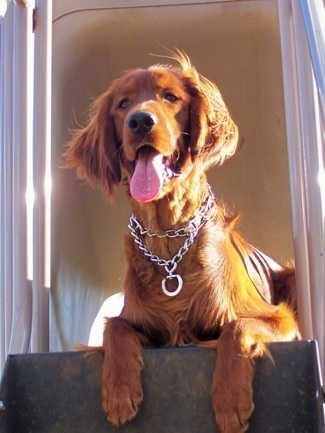
Bama the Irish Setter at 11 months old
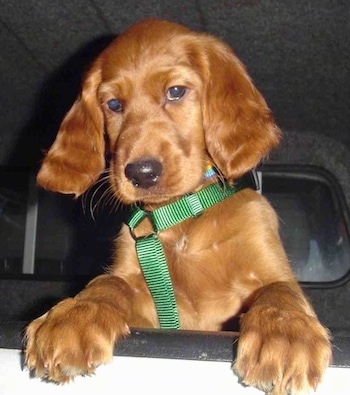
George the Irish Setter as a puppy at 2 months old—"This is George, my two-month-old Irish Setter puppy! I just got him today and he already seems to love his new home! He already knows how to sit and we're still working on the down command. George got his name by my family voting for what we wanted to name him. The names we had were George, Seamus, Champ and Bama. George got the most votes so that’s what we named him! George's friends are my German Shepherd named Jude and Himalayan cat named Mr. Jinx. I can't wait to see George grow up to be a healthy adult dog. :)"
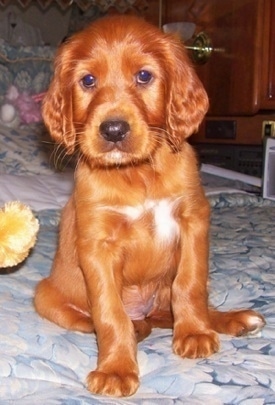
"This is my Irish Setter puppy Ala at 6 weeks old. Her nickname is Ala B. Her likes are spending time with me, going places with me and playing with her friend Bama (an adult Irish Setter), pointing at things, walking up and down stairs, running and riding in the truck. Her dislike is being scolded. Her favorite things to eat are her food (Royal Canine), dog cookies from PetCo's treat bar, anything she can get in her mouth to chew on, rib bones to chew on for dogs and pig ear chewies. Her favorite toys are a stuffed squeaky cow toy, tennis balls, a squeaky stuffed horse and pretty much anything that she can get her mouth on! She is a sweetie! She is going to be a beautiful dog when she grows up!"
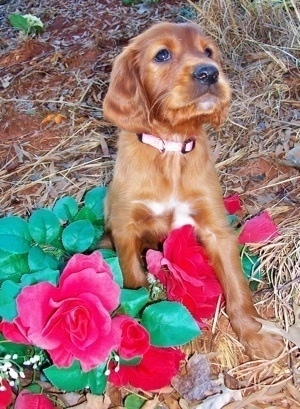
Ala the Irish Setter as a puppy at 6 weeks old sitting with the flowers
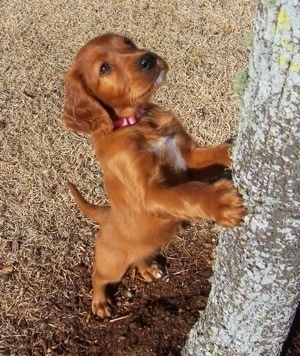
"Ala the Irish Setter Puppy at 7 weeks old—in this pic she thinks she is a Coonhound!! ;-) So funny! She is changing every day! I think she is going to be a big girl! She weighed a little over 9 lbs. at 7 weeks!! It's like she is getting taller every day! Such a fun breed of dog!"
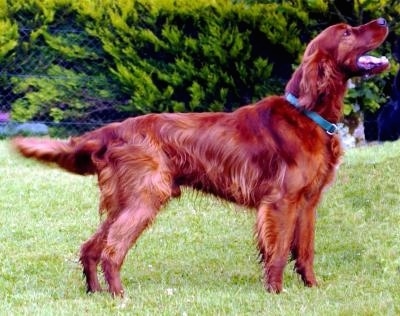
D'Arcy, a beautiful Irish Setter
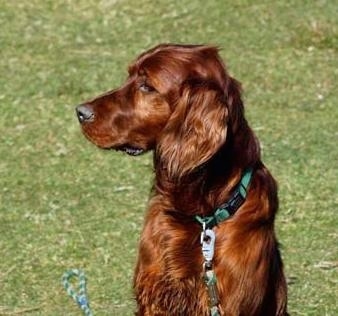
D'Arcy the Irish Setter
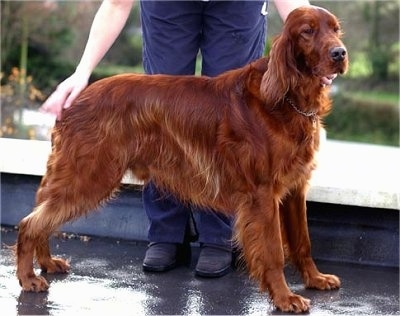
D'Arcy is of Irish breeding (born and lives in Ireland), and therefore doesn't carry as much of a coat as the American type.
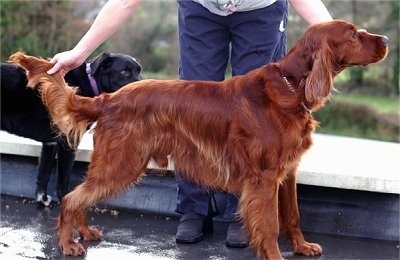
D'Arcy the Irish Setter
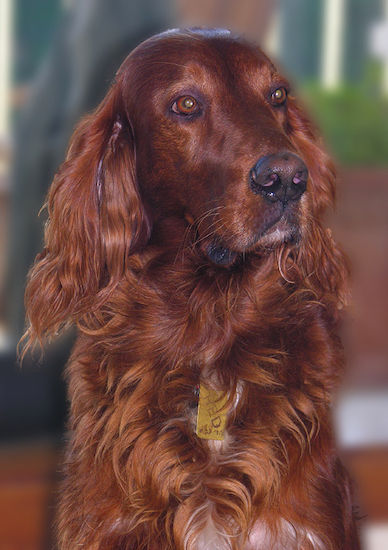
Red the Irish Setter